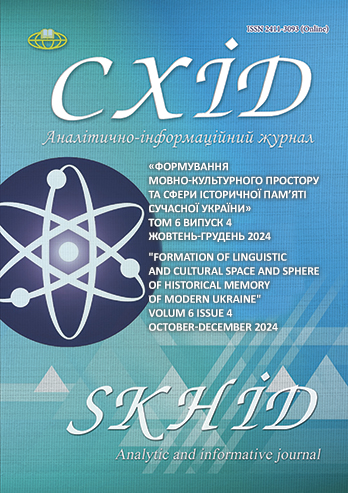A Study of Social Memory and Forgetting by Paul Connerton: Mechanisms and Tools
DOI:
https://doi.org/10.21847/2411-3093.2024.646Keywords:
Paul Connerton, social memory, collective memory, historical memory, social forgetting, social timeAbstract
This research is dedicated to the phenomenon of social memory and its component, social amnesia, as revealed in the works of the British sociologist and philosopher Paul Connerton. The author explores the identified types of social forgetting in the researcher's concept, analyzes the factors that give rise to them, and the mechanisms and tools for including the phenomenon in the metaphysics of social being and reality. The study highlights the significant contribution of this renowned sociologist to the theoretical exploration of social memory, social time, and social amnesia as factors in historical processes and as sociocultural determinants of sociogenesis.) The process of reflection of societal forgetting is interpreted as a rejection or removal from social and cultural memory of a reliable social assessment of the significance of these phenomena and facts. Spontaneous manifestations of social amnesia are inevitable in history, periodically projecting in society the need to temporarily relieve itself of the weight of comprehensive historical memory and responsibility. In this case, it has a functional aspect, being one of the mechanisms of psychological self-defense of society. It has been shown how society and the state, driven by their own needs, utilize instruments of social preservation to structure and construct their memories, endowing them with new interpretations to address various objectives. Each generation independently reshapes collective memories of the past; some of these memories become prominent in the current generation's mentality, while others are suppressed and undergo amnesia. The study examines models of sociocultural reproduction, highlighting Paul Connerton's interpretation of the possibility of social forgetting in its contemporary forms. The author concludes that, whereas in ancient societies disruptions in social memory were primarily effected through the physical eradication of groups and the destruction of written records, the modern era's cultural framework inherently facilitates and necessitates discontinuities in social memory and social forgetting.
Downloads
References
Anderson, B. (2001) Uyavleni spilnoty (Imagined Communities) [transl. from Eng.] Kyiv, Krytyka, https://shron1.chtyvo.org.ua/Anderson_Benedict/Uiavleni_spilnoty.pdf (In Ukrainian)
Assman, A. (2012). Prostory spohadu. Formy transformatsiyi kulturnoyi pamyati (Spaces of memory. Forms of transformation of cultural memory) (transl.from Germ.) Kyiv, Nika-Tsenter, 440 p. (In Ukrainian).
Vasylevska, T., & Bevz, T. (2024). Constructing a Policy of National Memory: Ideas, Meanings, Accents. Political Studies / Політичні дослідження, (1 (7), 135–158. https://doi.org/10.53317/2786-4774-2024-1-7
Connerton, P. (2004). Yak suspilstva pamyatayut [transl. from Eng.] Kyiv, Nika-Center, 184 p. (In Ukrainian).
Kyrydon, A. M. (2009). Kontsept “istorychna pamyat”: variatyvnist definiyuvannya. Ukrayina – Yevropa – Svit. Mizhnarodnyy zb. nauk. pr. Seriya: Istoriya, mizhnarodni vidnosyny. Issue 3. Ternopil, V. Hnatyuk TNPU Publisching, p. 112–116. (In Ukrainian).
Kuprii, T. (2019). Pamyat pro zlochyny natsystiv v politychnykh konstruktakh povoyennoyi istorychnoyi svidomosti Nimechchyny. In: Skladni pytannya istorychnoyi pam'yati u paradyhmi dialohichnosti kultur. Białystok: Białoruskie Towarzystwo Historyczne, 2019. 93-124 (In Ukrainian).
Kuprii, T. (2018). Successes and problems of “reeducation”: to the 70th anniversary of completion of denazification of Germany. Skhid, 4(156), 49–55. https://doi.org/10.21847/1728-9343.2018.4(156).143498 (In Ukrainian)
Mozhova, N. H. (2021). Konfihuratsiya kolektyvnoyi pamyati v epokhu hlobalizatsiyi. In: Hlobalni transformatsiyi u sferi kultury: vyklyky siohodennya. Zbirnyk naukovykh prats. Materialy Mizhnarodnoyi naukovoyi konferentsiyi (Lviv, 29-30/10/2021). Lviv, Ivan Franko Lviv National Unoversity, pp. 36-40. (In Ukrainian).
Nagorna, L. (2012). Historical memory: theories, dis-courses, reflections. Kyiv, F. Kuras Institute, NAS of Ukraine, 328 p. (In Ukrainian).
Shlipchenko, S. (2024). Peredmova perekladacha. In: Izbornyk. http://litopys.org.ua/connert/conn01.htm (In Ukrainian).
Kundera, M. (2022). Knyha smikhu i zabuttya. Lviv, Vydavnytstvo staroho Leva, 272 p. (In Ukrainian)
Connerton, P. (2009). How Modernity Forgets. Cambridge, Cambridge University Press, 149 p.
Connerton, P. (1989). How Societies Remember. Cambridge, Cambridge University Press, 1989. 121 p.
Connerton, P. (2008). Seven types of forgetting. Memory Studies, 1, 59–71. https://marcuse.faculty.history.ucsb.edu/ clas-ses/201/articles /08 Connerton7 TypesForgetting.pdf.
Connerton, P. (2011). The Spirit of Mourning: History, Memory and the Body. Cambridge, Cambridge University Press, 192 p.
Kastner, J.& Najafi, S. (2020, 1 February). “Historical Amnesia: An Interview with Paul Connerton, 2011. Seven types of forgetting”. https://www.cabinetmagazine.org/issues/42/kastner_najafi_connerton.php
Rieff, D. (2016). In Praise of Forgetting: Historical Memory and Its Ironies. Yale, Yale University Press, 160 p.
Shnirelman, V.A. (1996). Who gets the past? Competition for ancestors among nonRussian intellectuals in Russia. Washington (D. C.) etc.: Woodrow Wilson Center Press and Johns Hopkins Univ. press, 239 р.
Downloads
Published
How to Cite
Issue
Section
License
Copyright (c) 2025 Тетяна Купрій

This work is licensed under a Creative Commons Attribution-NonCommercial-NoDerivatives 4.0 International License.
1. Authors bear responsibility for the accuracy of facts, quotations, numbers and names used.
2. Manuscripts are not sent back.
3. The publisher does not always agree with the authors' opinion.
4. The authors reserve the right to authorship of the work and pass the first publication right of this work to the journal under the terms of a Creative Commons Attribution-NonCommercial-NoDerivatives 4.0 International License. This license allows others to distribute (copy) the published work for non-commercial purposes, provided there is mandatory attribution to its authors and a link to the first publication in our journal.
5. The authors have the right to conclude separate supplement agreements that relate to non-exclusive work distribution in the form in which it has been published by the journal (for example, to upload the work to the online storage of the journal or publish it as part of a monograph), provided that the reference to the first publication of the work in this journal is included.

